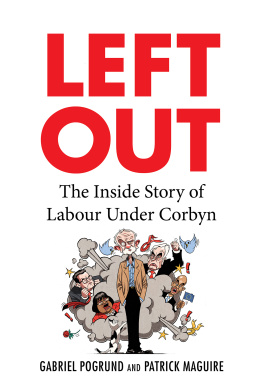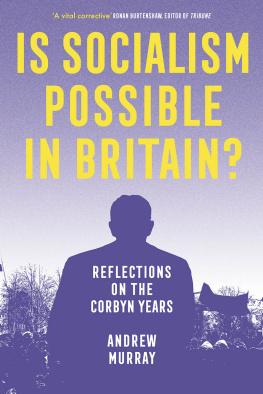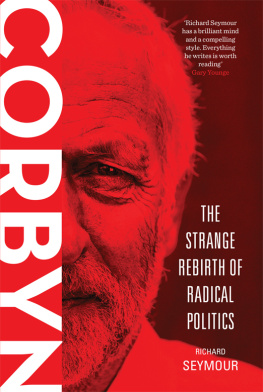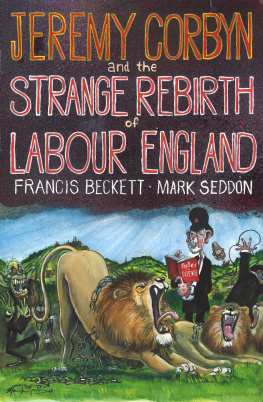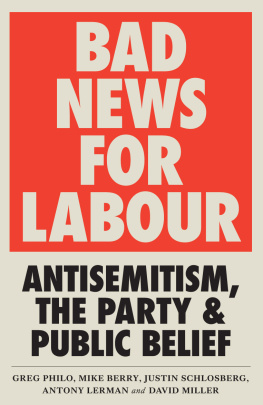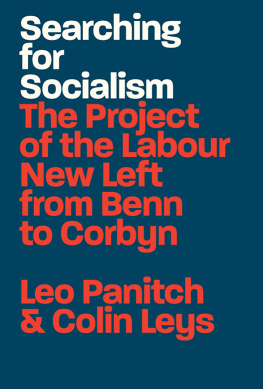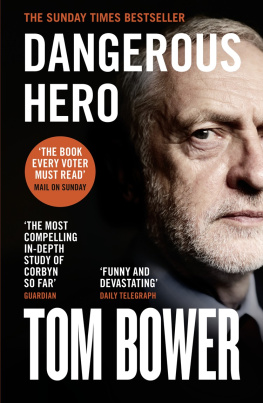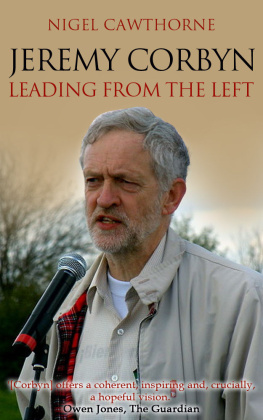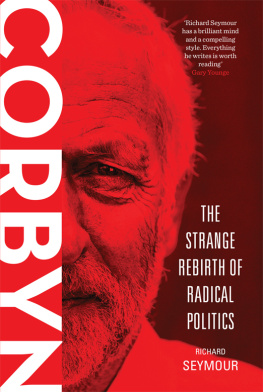Gabriel Pogrund - Left Out: The Inside Story of Labour Under Corbyn
Here you can read online Gabriel Pogrund - Left Out: The Inside Story of Labour Under Corbyn full text of the book (entire story) in english for free. Download pdf and epub, get meaning, cover and reviews about this ebook. City: London, year: 2020, publisher: Penguin Books Ltd, genre: Detective and thriller. Description of the work, (preface) as well as reviews are available. Best literature library LitArk.com created for fans of good reading and offers a wide selection of genres:
Romance novel
Science fiction
Adventure
Detective
Science
History
Home and family
Prose
Art
Politics
Computer
Non-fiction
Religion
Business
Children
Humor
Choose a favorite category and find really read worthwhile books. Enjoy immersion in the world of imagination, feel the emotions of the characters or learn something new for yourself, make an fascinating discovery.
- Book:Left Out: The Inside Story of Labour Under Corbyn
- Author:
- Publisher:Penguin Books Ltd
- Genre:
- Year:2020
- City:London
- Rating:3 / 5
- Favourites:Add to favourites
- Your mark:
- 60
- 1
- 2
- 3
- 4
- 5
Left Out: The Inside Story of Labour Under Corbyn: summary, description and annotation
We offer to read an annotation, description, summary or preface (depends on what the author of the book "Left Out: The Inside Story of Labour Under Corbyn" wrote himself). If you haven't found the necessary information about the book — write in the comments, we will try to find it.
Left Out: The Inside Story of Labour Under Corbyn — read online for free the complete book (whole text) full work
Below is the text of the book, divided by pages. System saving the place of the last page read, allows you to conveniently read the book "Left Out: The Inside Story of Labour Under Corbyn" online for free, without having to search again every time where you left off. Put a bookmark, and you can go to the page where you finished reading at any time.
Font size:
Interval:
Bookmark:



Gabriel Pogrund is Whitehall Correspondent for The Sunday Times. He was 2018 Laurence Stern fellow at the Washington Post, and 2017 Young Journalist of the Year at the Press Awards.
Patrick Maguire is a political reporter for The Times in Westminster. He previously worked at the New Statesman and Observer, and won the 2016 Anthony Howard Award for young journalists.
Heavy is the head that wears the crown
Stormzy
We won the argument
Jeremy Corbyn
I own this disaster
John McDonnell
Just after 10 p.m. on 12 December 2019, Jeremy Corbyn emerged, ashen-faced and bleary-eyed, from an anteroom in the offices of Freedom from Torture, a charity for refugees with post-traumatic stress disorder in his Islington North constituency. The premises had been requisitioned as a venue for what many of Corbyns aides hoped against hope would be a victory party. Labour MPs had not wanted an election. But those closest to Corbyn believed he could recapture the energy and optimism of the heady summer of 2017. At that election, he had gathered his close circle in the tiny living room of his terraced home in Finsbury Park to learn of what they were certain would be a defeat, if a valiant one. Only his two closest aides, Karie Murphy and Seumas Milne, and his wife, Laura Alvarez, had been there to witness the miracle, along with a handful of intimates.
No expense had been spared for 2019. Over the past six weeks, the Project had faced its final test. Corbyn, a private man unwilling and unable to accept the press intrusion all party leaders must endure, wanted to receive the results in peace, untroubled by the pack that camped every morning on his doorstep. No more than two dozen people, the Projects most loyal servants and Corbyns family and closest friends, had been invited. His protection officers had vetoed his first choice of an Ethiopian restaurant next to Arsenals Emirates Stadium. Earlier in the day, Corbyns staff had been dispatched down the Holloway Road, returning with a Waitrose Victoria sponge decorated with a number 10 candle a hopeful reference to his new address. Milne cast a jaundiced eye at the cake and laughed drily. We wont be needing that, he confided to a colleague. We arent going to win. At best Corbyn might hope to form a coalition. A few miles away at Southside the partys glass-and-steel head office in Victoria tables groaned under the weight of bottles of Corbynista Victory Ale, brewed specially for the occasion.
Milne knew they would have no cause to open them. He had seen the internal polling that showed they were on course for an apocalyptic defeat. The figures had been kept secret. The Project lived in fear of leaks and at times did not even trust the numbers themselves. The final prediction of Labours secret model, which drew on data from 25,000 voters, was just shy of 180 seats. On those numbers they would not be forming any kind of government. They would barely be able to function as an opposition party.
Still, many in the room believed they might be on the brink of power or acted in that spirit. A week before the election, Nicolette Petersen, Corbyns personal secretary, circulated an itinerary for election day among his inner circle. There was no doubt as to how the night would end: Day after: busy day!!! Number 10, the document read. That same week, his office had circulated plans for the first days of a Labour government, listing its plans to reform some Whitehall departments, abolish others and appoint a Cabinet of true socialists. John McDonnell, Corbyns Shadow Chancellor and oldest friend in politics, would go to Bloomberg and deliver a speech to calm the markets. He would then broker a confidence-and-supply agreement with the Scottish National Party. The question of a second Scottish referendum would be deferred to the next election. Diane Abbott, another intimate, would be promoted to Foreign Secretary and declare a new role for Britain in the world every bit as ambitious as Boris Johnsons plan to cut loose from Brussels.
As 10 p.m. and the exit poll drew closer, Corbyns disciples filed into the party. With half an hour to go, the leader, his family and his close team were shown to a side room with a window looking out into the main area. His wife, Laura, did not leave his side. His three boys were joined by Milne and Helene Reardon-Bond, Corbyns chief of staff. Andrew Fisher, his director of policy, followed, as did Anjula Singh, Labours head of press. This was Corbyns inner sanctum: those who he wanted by his side on the night. One aide pulled the blinds closed. This would be their result to savour alone, if only for a few moments.
The crowd gathered around the two televisions rigged up in each room. The chimes of Big Ben rang out from Sky News and the BBC. Every public and private poll indicated that Corbyn was heading for a historic defeat. But the convention and candour that had defined previous campaigns was absent. In 2015, Labour staff had been told at the outset that their mission was to deny David Cameron a majority, not to win. At the outset of the 2019 campaign, Corbyns inner circle had aimed to win. Three months previously, Milne had written to colleagues: Our objective must be to win a majority, and that must underlie everything we do in the campaign. Nor were they in the business of candour when the polls had refused to budge, given the need to maintain morale and the seditious officials at party HQ who simply never went away. At the outset of the campaign, Corbyn himself had responded to the leak of the partys grid the spreadsheet outlining the timing and responsibility of policy announcements by emailing colleagues to say that It is disgusting the degree of self-absorbed disloyalty that some person or persons have. Our members do not sweat night and day to see their party damaged by this behaviour. Polling would be circulated among only a handful of people. So it was that in 2019, in spite of all the evidence, many in the room and many of those members believed they would win or, at worst, emerge as contenders in a hung parliament.
As the BBC revealed that Boris Johnson was on course for a majority of eighty seats and that Corbyn was set to lead Labour to just 191 the room fell silent. Those in Corbyns antechamber were dumbstruck too. The party atmosphere turned funereal. Corbyn roamed a room overcome by silence. Im sorry, he said in turn to shell-shocked groups. This is on me. His wife wept. Frances Leach, Corbyns millennial head of events, cried as though someone had died. For several generations of the left, something had.
It was immediately clear from the scale of the defeat that Corbyn was beyond saving. The job now was to save Corbynism. Milne immediately dispatched a pre-written briefing note for allies and Shadow ministers. This defeat is overwhelmingly down to one issue the divisions in the country over Brexit, and the Tory campaign, echoed by most of the media, to persuade people that only Boris Johnson can get Brexit done Labour will have to learn lessons from this defeat, above all by listening to those lifelong Labour voters who we lost in working-class communities.
Next pageFont size:
Interval:
Bookmark:
Similar books «Left Out: The Inside Story of Labour Under Corbyn»
Look at similar books to Left Out: The Inside Story of Labour Under Corbyn. We have selected literature similar in name and meaning in the hope of providing readers with more options to find new, interesting, not yet read works.
Discussion, reviews of the book Left Out: The Inside Story of Labour Under Corbyn and just readers' own opinions. Leave your comments, write what you think about the work, its meaning or the main characters. Specify what exactly you liked and what you didn't like, and why you think so.

